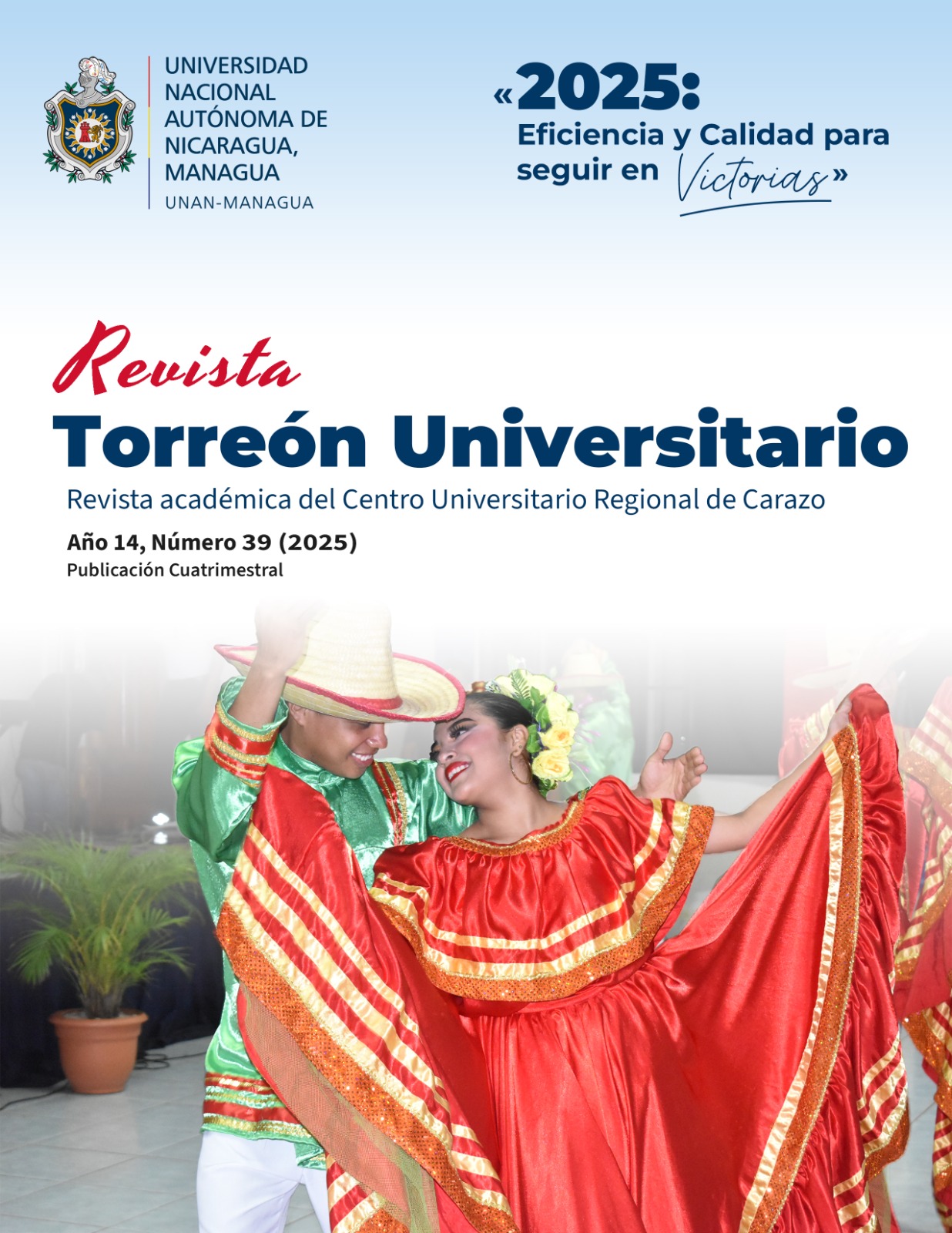Learning styles and comprehension of lyric text in middle school: a study in 9th grade
DOI:
https://doi.org/10.5377/rtu.v14i39.20045Keywords:
Social development, population, social inclusion, education, interculturality and democracyAbstract
The identification of the difficulties and learning styles of the students is a relevant topic that should be included in the planning of the educational act, this action will allow the implementation of strategies adequate to the learning needs. This paper presents the results of the analysis of the learning process of the lyrical text of the 9th grade students of the Rafaela Herrera School in the municipality of Masaya. We worked under the interpretative paradigm, the qualitative approach and the phenomenological type of research. The population was students, teachers who attended the process of teaching and learning of language and literature. The sample consisted of 39 students, 3 teachers and the 9th grade curriculum, selected by convenience. For the collection of information, a diagnostic test, an interview guide, the test on learning styles proposed by Kolb and a checklist were applied. The most relevant results focus on the two main actors of the teaching-learning process: the students, who present difficulties in learning lyrical texts, and the identification of their learning style. It is important for teachers to have scientific knowledge of learning styles because it will allow them to implement strategies contextualized to the learning style of their students.
Downloads
References
Abreu Alvarado, Y., Barrera Jiménez, A,D., Breijo Worosz, T., Bonilla Vichot, I. (2018) El proceso de enseñanza-aprendizaje de los Estudios Lingüísticos: su impacto 2018 en la motivación hacia el estudio de la lengua. Mendive Revista de Educación. vol. 16,610- 623 http://mendive.upr.edu.cu/index.php/MendiveUPR/article/view/1462
Aebli, H. (1958). Una didáctica fundada en la psicología de Jean Piaget. Kapelusz. https://bibliotecadigital.uchile.cl/discovery/ fulldisplay?vid=56UDC_INST:56UDC_ INST&docid=alma99100271 7509703936&lang=es&context=L
Cabrera Santander, junio (2019). Aplicación de estrategias de lectura para favorecer la interpretación de textos líricos. Facultad de Filosofía y Educación Instituto de Literatura y Ciencias del Lenguaje, Trabajo de titulación para optar al grado de Licenciado en Educación y al Título de profesor de Castellano y Comunicación, Universidad Católica de Valparaíso, Chile. http://opac.pucv.cl/pucv_txt/txt- 9500/UCC9710_01.pdf
Avolio de Cols, S. & Iacolutti, D. L (2006). Enseñar y Evaluar, en formación por competencias laborales. Conceptos y orientaciones metodológicas. Banco Interamericano de Desarrollo
Ortiz Granja, D., (2015). El constructivismo como teoría y método de enseñanza. Sophia, Colección de Filosofía de la Educación, (19), 93-110. https://www.redalyc.org/pdf/4418/441846096005.pdf
Gobierno de Reconciliación y Unidad Nacional, El Pueblo presidente. Ministerio de Educación (MINED). (2009). Programa de Estudio de Lengua y Literatura. Educación Secundaria. (7mo, 8vo y 9no grado). MINED
Kolb, D. (1984a). Experiential learning experiences as the source of learning development. Prentice Hall.
Kolb, D. (1984b). Psicología de las organizaciones: experiencia. Prentice Hall.
Martínez Vanegas, R. I., Vanegas, M., Radamez, O., & Lozano López, D. L. (2019). El empleo de la música como estrategia metodológica para el desarrollo de la comprensión lectora de textos líricos (Doctoral disertación, Universidad Nacional Autónoma de Nicaragua, Managua).
Méndez, Anchía, S. (2000). La mediación docente en la comprensión de lectura de textos literarios. Revista Educación, 24(1), 89-105. https://revistas.ucr.ac.cr/index.php/educacion/article/view/1052
Paula, A. (7 Julio 2016). Los géneros literarios/ literatura infantil y juvenil SM. Literatura SM.COM https://es.literaturasm.com/somos-lectores/generos-literarios
Ramírez Molina, C. (2006). Estrategias Metodológicas Utilizadas Por Docentes De Sétimo Año en la Enseñanza del Análisis de Textos Literarios. Revista de Filología y Lingüística de La Universidad de Costa Rica, 32(2), 87–106. https://doi.org/10.15517/rfl.v32i2.4292, https://web.s.ebscohost.com/ehost/detail/ detail?vid=0&sid=fd9db1b4-5a69-4603- a623b068f0e9dcf%40redis&bdata =Jmxhbmc9ZXMmc2l0ZT1l aG9zdC1saXZl#AN=33930345&d b=asn
Rodríguez, Guzmán, J.P. (2015). Gramática Figura. Editorial Carena
Rodríguez Reyes, C. (2012). El lugar de la Teoría literaria en la didáctica de la Literatura. https://repositorio.ual.es/bitstream/handle/10835/5235/73-570-1- PB.pdf?sequence=1
Romero Agudelo, L. N., Salinas Urbina, V., & Mortera Gutiérrez, F. J. (2010). Estilos de aprendizaje basados en el modelo de Kolb en la educación virtual. Apertura, 2(1). https://www.redalyc.org/pdf/688/68820841007.pdf
Todorov, Tzvetan. (1991). Los Géneros del Discurso. Monte Ávila Latinoamericana.
https://es.scribd.com/doc/311908047/TODOROV-Tzvetan-Los-Generos-del-Discurso-pdf
Wellek, R. & Warren, A. (1985). Teoría Literaria. (José Ma Gimeno, Trad.) Editorial Gredós (Obra original publicada en 1953)
Downloads
Published
Issue
Section
License
Copyright (c) 2025 National Autonomous University of Nicaragua, Managua

This work is licensed under a Creative Commons Attribution-NonCommercial-NoDerivatives 4.0 International License.
The authors who publish in this journal agree to the following terms.
- The author or authors of the articles, essays or research grant the National Autonomous University of Nicaragua, Managua (UNAN-Managua) the editing rights (copyright) of the submitted work, therefore the University has the exclusive right to publish the article for the entire copyright period.
- These copyrights/authors authorize Torreón Universitario Magazine and the University to edit and disseminate/publish the article in said Magazine, including printed and electronic reproduction, storage, retrieval and any other type of publication, and sources of secondary information as services. of summaries and databases, they also empower it to protect the article against unauthorized use for dissemination by printed or electronic media (PDF, HTML, EPUB, XML or others).
License for use of content
The magazine uses the Creative Commons Attribution-NonCommercial-NoDerivs 4.0 International License.
Under this statement:

This journal is licensed under a Creative Commons Attribution-NonCommercial-NoDerivatives 4.0 International License. It can be copied, distributed and transmitted publicly as long as the author and source are cited (Revista Torreón Universitario), it should not be modified or used for any commercial purpose. The full license can be found at http://creativecommons.org/licenses/by-nc-nd/4.0/.



